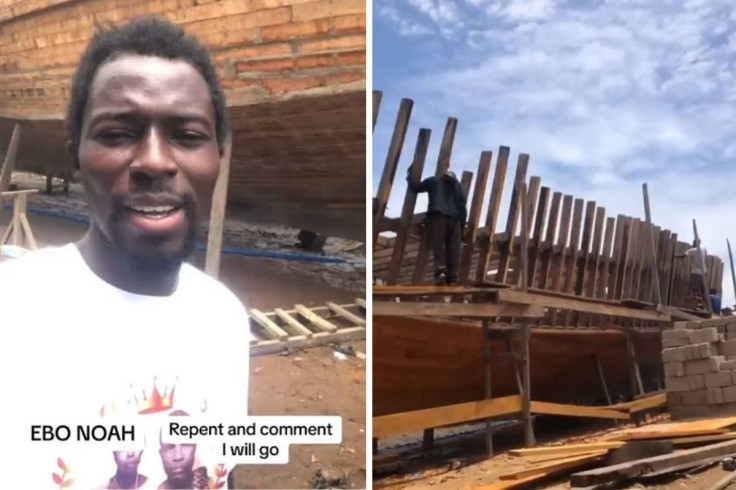Viral Video Claims A 'Noah's Ark Of Doom' Is Being Built In Ghana Ahead Of A 3-Year Flood — Real Or AI Hoax?
Videos of a so-called Ghanaian prophet building an 'ark' ahead of a predicted global flood have gone viral

A series of viral videos claiming to show a Ghanaian prophet building a modern-day ark have sparked global debate over whether the footage depicts a genuine act of faith or an elaborate hoax enhanced by artificial intelligence.
The clips, which began circulating in late August 2025, show a man identified as 'Noah' or 'Prophet Ebo Noah' overseeing the construction of a large wooden vessel. The narration claims God warned him of a coming flood that will begin in December 2025 and last three years.
A post on X on 6 October stated, 'Ghanaian Prophet Builds Modern-Day Noah's Ark, Says World Is Ending on 25 December.' The post added that Prophet Ebo Noah said God instructed him to build an ark capable of carrying 5,000 people, and that it was nearly complete after three months of construction.
The Claims
The videos present 'Noah from Ghana' as a modern-day version of the biblical figure, asserting that he is constructing a vast wooden ark under divine orders. In the footage, the man can be heard warning of divine retribution and urging viewers to repent.
While the imagery appears compelling, there is no independent verification of the man's identity, location or the scale of the structure. The predicted three-year global flood lacks support from any recognised scientific, religious or meteorological authority.
Multiple short clips, some credited to the now-deleted TikTok account @EboJesus1, show similar scenes of timber construction and group prayers. Analysts say the varying lighting, inconsistent details and uniform narration suggest the material may have been edited or algorithmically enhanced to appear more dramatic.
Experts Question Authenticity
Digital-forensics specialists say many viral clips now show signs of manipulation. High-quality visuals, uniform voice-overs and the absence of background sound can all indicate engineered content rather than spontaneous recording. Analysts note that apocalyptic or scriptural themes are increasingly used in misinformation campaigns that blend faith-based imagery with social media customisation and automated distribution.
Some online users, particularly within Christian communities, have cited verses such as Genesis 9:11-13, which promise that God will never again flood the Earth, to challenge the video's message. Others warn that this mix of prophecy and algorithmic amplification may cause unnecessary alarm, particularly among viewers with strong literal beliefs.
Fact-checkers in both the UK and West Africa have yet to verify the footage or confirm whether Prophet Ebo Noah exists. Observers say the combination of spiritual narrative and emerging AI tools highlights how quickly content can travel before authentication takes place.
Ghanaian Prophet Builds Modern-Day Noah’s Ark, Says World Is Ending on 25 December
— GODLINE TRENDS.COM (@godlinetrend247) October 6, 2025
Prophet Ebo Noah from Ghana claims God instructed him to build an Ark that can carry up to 5,000 people and he’s nearly done after just 3 months of construction pic.twitter.com/qXfvYOblQn
Apparently there is a man in Ghana building an Ark. (His name is also Noah btw) and we are all supposed to travel there. The flood is expected to start on 25th December
— Irrelevant (@Berry_Blue__) October 19, 2025
UPDATE ‼️ “The ark is 80% done… you’ve to get here before 25th” — The Ghanaian man, Eno Noah, who earlier claimed God will destroy the world with 3–4 years of continuous rain has revealed progress on his mission.
— WithAlvin 🇬🇭 (@withAlvin__) August 26, 2025
He says he’s building 10 arks to house his family, pairs of… https://t.co/Vjzt8X370f pic.twitter.com/0Kx2OqD8T3
Why It Matters
Experts say the 'Noah from Ghana' trend illustrates how religious storytelling, social media virality and AI technology are converging to create narratives that appear authentic but resist verification. Even if the videos record a real local project, the framing and reach have turned it into a global phenomenon shaped by digital amplification.
At present, there is no evidence that a prophet named Ebo Noah is building a functional ark or that any global flood is imminent. The story instead reveals how easily faith, fiction and technology can merge online, raising fresh concerns about misinformation and the fragile boundary between belief and reality in the digital age.
© Copyright IBTimes 2025. All rights reserved.





















